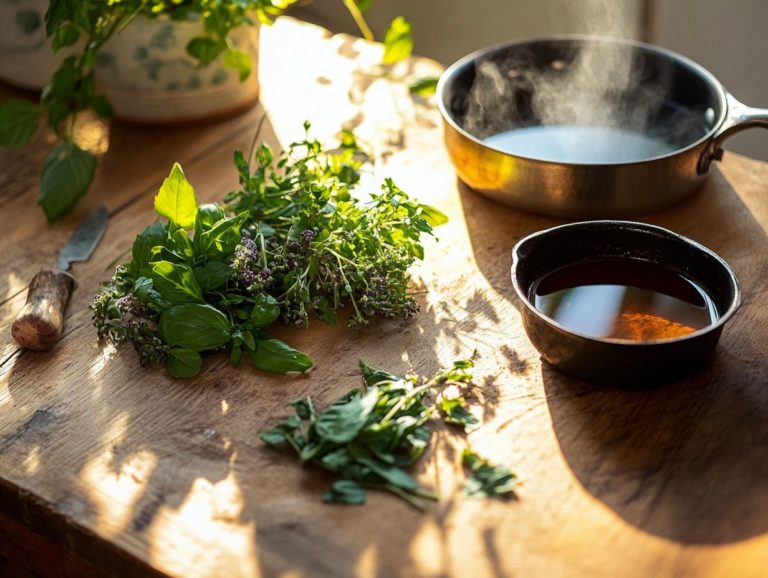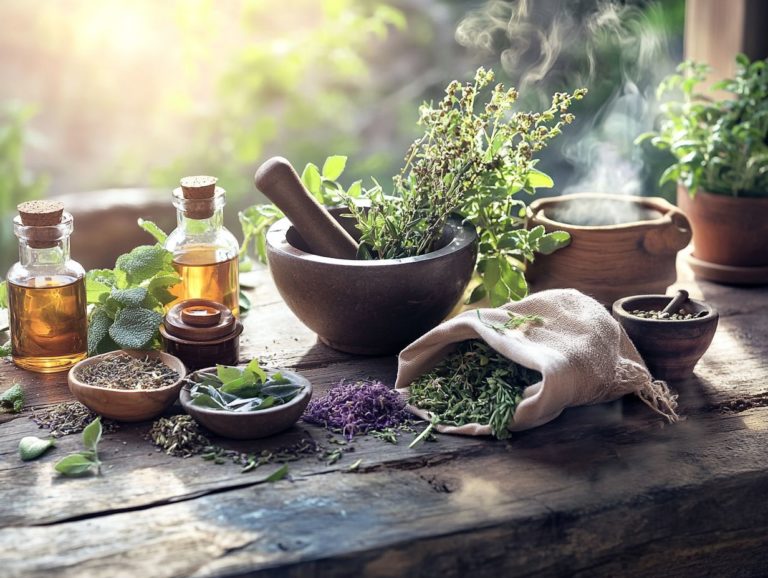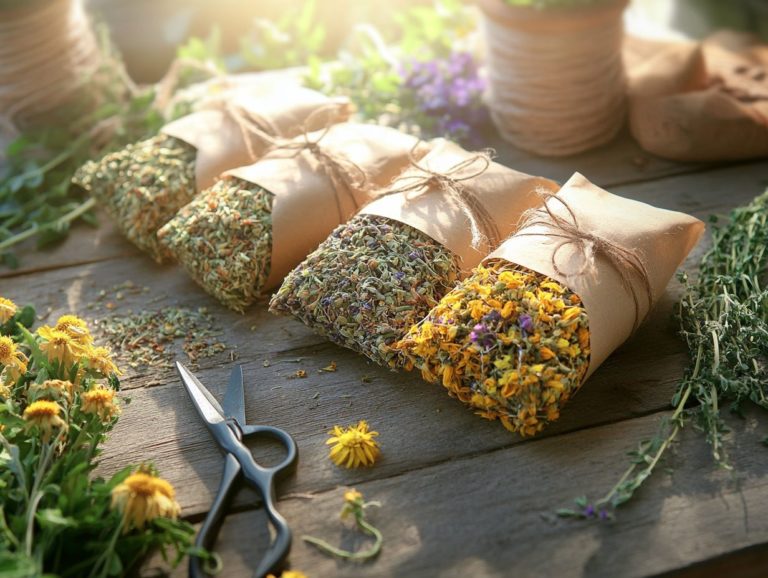5 DIY Herbal Remedies for Seasonal Allergies
Seasonal allergies can transform the bliss of spring and summer into a relentless battle against sneezing, itching, and congestion, impacting millions along the way. The good news is that nature provides a wealth of herbal remedies designed to help ease these pesky symptoms naturally.
This article explores the causes of seasonal allergies, presents several effective herbal solutions, and offers tips on seamlessly integrating them into your daily life. It also outlines essential precautions and suggests when it may be time to seek medical assistance. Experience relief now with these powerful natural remedies!
Contents
- Key Takeaways:
- 2. Understanding the Causes of Seasonal Allergies
- 3. Herbal Remedies for Seasonal Allergies
- 4. How to Incorporate These Remedies into Your Daily Routine
- 5. Precautions and Warnings
- 6. Other Natural Ways to Manage Seasonal Allergies
- 7. When to Seek Medical Attention
- What Are Seasonal Allergies and How Do They Affect the Body?
- Frequently Asked Questions
- What are 5 DIY Herbal Remedies for Seasonal Allergies?
- How can nettle leaf help with seasonal allergies?
- What is butterbur and how does it relieve seasonal allergies?
- Can quercetin help with seasonal allergies?
- How can elderberry be used to combat seasonal allergies?
- What is the best way to use eucalyptus essential oil for seasonal allergies and allergy relief?
Key Takeaways:
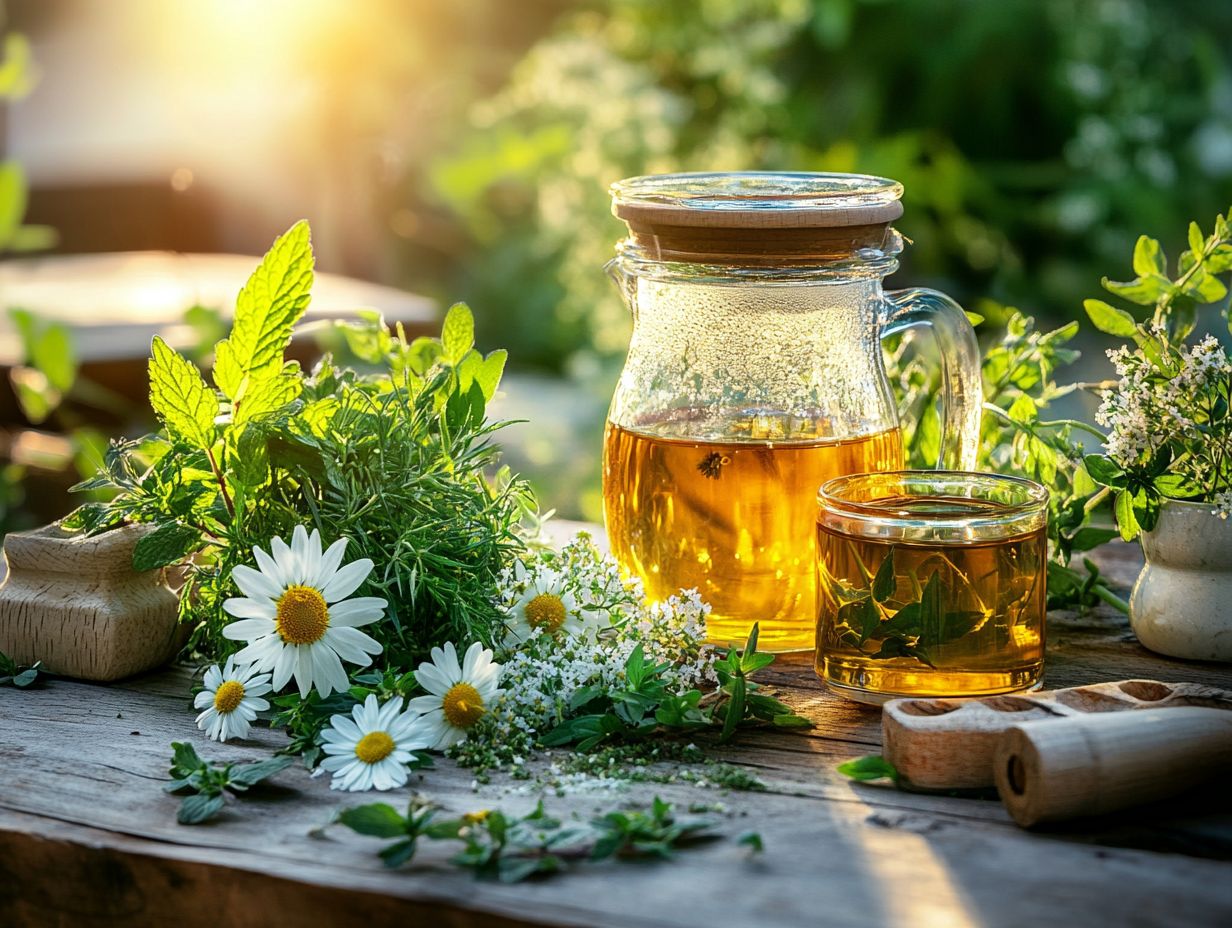
- Incorporate nettle leaf tea into your daily routine to reduce seasonal allergy symptoms.
- Quercetin supplements and local honey may help alleviate seasonal allergies.
- Use butterbur extract and peppermint essential oil as natural remedies for seasonal allergies, but be cautious of potential risks and side effects.
2. Understanding the Causes of Seasonal Allergies
Seasonal allergies primarily stem from environmental allergens, with pollen from trees, grasses, and weeds being the main culprits. When you’re susceptible, this pollen triggers how your body reacts to allergens, leading to a range of annoying symptoms.
In spring, tree pollen causes discomfort as the buds bloom and release fine grains into the air. As the seasons shift, grass pollen becomes prevalent from late spring to early summer, followed by ragweed pollen from late summer into fall. These fluctuations can significantly impact your quality of life, causing symptoms like sneezing, sinus congestion, and itchy eyes.
But it s not just pollen to be wary of; allergens like dust mites, which thrive in your home, can worsen these symptoms. Understanding these triggers and how your body reacts is crucial for finding relief and managing discomfort.
3. Herbal Remedies for Seasonal Allergies
Herbal remedies offer a holistic approach to managing seasonal allergies, providing relief through natural substances that alleviate symptoms and enhance overall health. These remedies are rooted in traditional medicine, with many used across various cultures for centuries.
Take nettle leaf tea, for example. Extracted from the sting nettle plant, it’s packed with nutrients and has antihistamine properties that can soothe your body’s reaction to allergens. For those interested in natural remedies, DIY herbal treatments for skin irritations can also be effective. Research suggests that quercetin supplementation may stabilize mast cells, helping reduce allergy flare-ups.
Local honey may boost immunity; consuming it regularly could help desensitize you to local pollen. Butterbur extract has shown promise in studies for effectively reducing nasal symptoms, while peppermint essential oil can be applied topically or diffused to relieve sinus pressure.
By leveraging these remedies, you can create a personalized strategy for managing your allergic responses during peak seasons.
3.1. Nettle Leaf Tea
Nettle leaf tea is celebrated for its remarkable ability to ease seasonal allergies, acting as a natural antihistamine that can help reduce inflammation and alleviate common symptoms like sneezing and nasal congestion.
This herbal infusion has a rich history, with records of its use in traditional medicine for various ailments, including allergies. To prepare your tea, steep fresh or dried nettle leaves in hot water, allowing beneficial compounds to infuse into the liquid.
The science behind its effectiveness lies in specific phytochemicals that inhibit histamine release. Many users report significant improvements in their allergy symptoms after incorporating nettle leaf tea into their routine, praising its soothing effects and earthy flavor.
3.2. Quercetin Supplements
Quercetin is a remarkable flavonoid found in a variety of fruits and vegetables. It plays a vital role in managing allergies by stabilizing mast cells and preventing the release of histamines. This effectively reduces those pesky allergy symptoms.
Incorporating quercetin-rich foods into your daily routine can be especially advantageous if you suffer from seasonal allergies. Some noteworthy sources include:
- Apples
- Onions
- Berries
- Kale
These options can effortlessly enhance your salads, smoothies, or saut s. For optimal results, a typical daily dosage hovers between 500 to 1,000 mg. However, consult a healthcare professional before diving into any supplementation.
While quercetin is generally well-tolerated, be aware that it may cause mild side effects, such as headaches or gastrointestinal discomfort, in some individuals. Easing into increased consumption can be a smart strategy for identifying your personal tolerance levels.
3.3. Local Honey
Local honey is celebrated for its health benefits, particularly its potential to provide allergy relief. By introducing your immune system to local pollen, it helps you build resistance to allergens.
This fascinating natural remedy operates on the principle of immunotherapy, a way to help your immune system adapt over time. Typically crafted by bees that collect nectar from nearby flowering plants, local honey retains traces of local pollen, which may offer relief to those grappling with seasonal allergies. Additionally, exploring DIY herbal remedies for digestive health can further support your overall well-being.
Incorporating local honey into your routine can reduce allergy symptoms. The minuscule amounts of pollen consumed may help your body recognize them as harmless instead of harmful.
Enjoy local honey in many delightful ways:
- Drizzle it over your breakfast oats
- Mix it into herbal teas
- Use it as a natural sweetener in smoothies
While further research is warranted, numerous individuals have reported noticeable improvements. Try adding local honey to your tea and see how it works for you!
3.4. Butterbur Extract
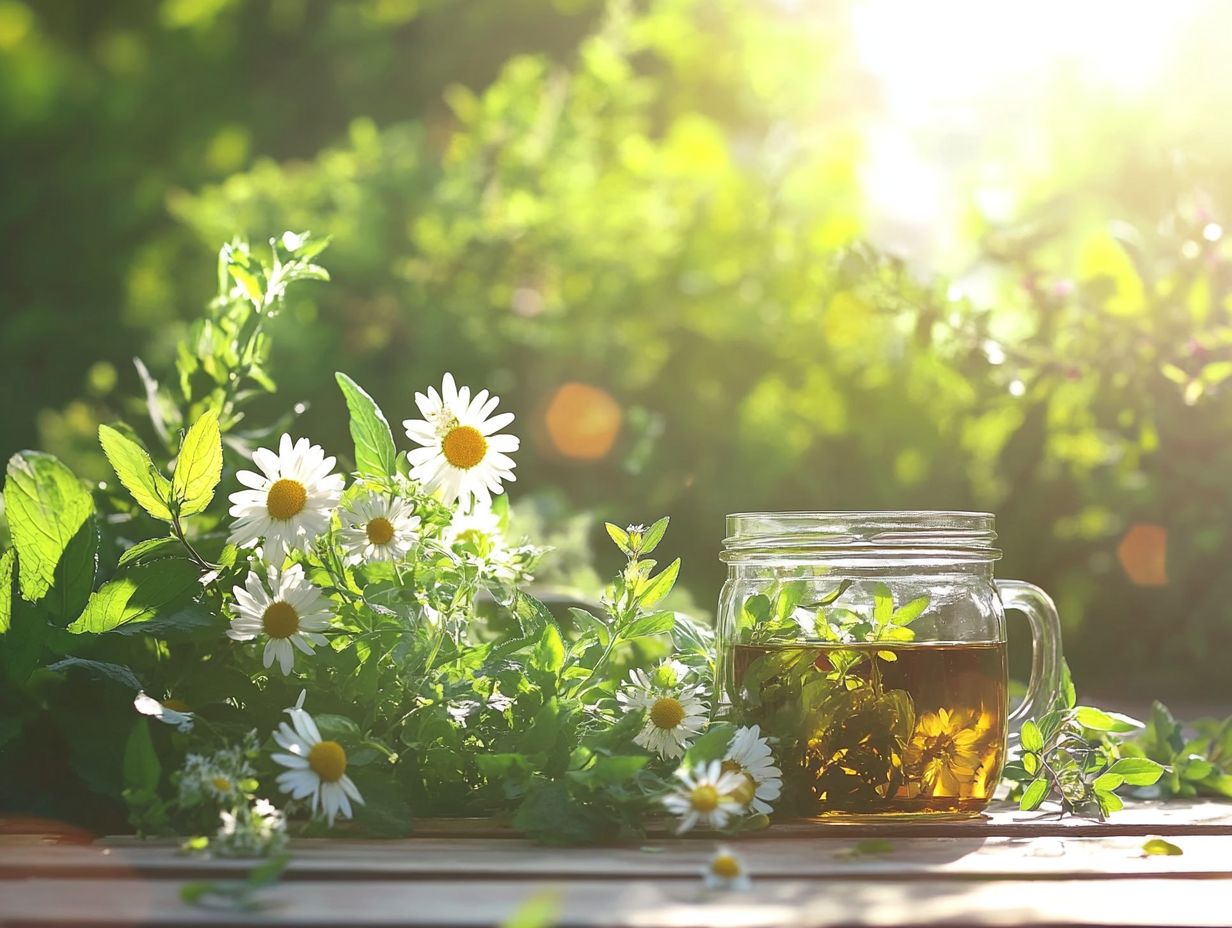
Butterbur extract stands out as a promising herbal remedy for seasonal allergies. It is celebrated for its antihistamine properties and its ability to control inflammation, offering a natural alternative to conventional medications.
Originating from regions across Europe, Asia, and North America, butterbur has a rich history of use for alleviating various ailments. Its active compounds, petasin and isopetasin, block the release of histamines, helping to ease the discomfort that often accompanies allergic reactions.
For optimal allergy management, dosages typically range from 50 to 150 milligrams daily, tailored to the specific product and your individual needs. It is essential to consult a healthcare professional before starting any new supplement, especially if you have pre-existing conditions or are pregnant.
Butterbur can sometimes lead to side effects or interact with other medications. A little precaution can go a long way in ensuring your safety.
3.5. Peppermint Essential Oil
Peppermint essential oil is a highly effective natural remedy for sinus congestion and the pesky symptoms of seasonal allergies. Its cooling effect soothes irritated nasal passages, making breathing feel much easier.
You can harness its benefits in several ways. Inhalation is one of the simplest and most effective methods. Just place a few drops in a diffuser or add it to a bowl of hot water and breathe in the steam for immediate relief.
For a more targeted approach, consider topical application. Diluting a drop or two in a carrier oil like coconut or olive oil helps dilute essential oils for safe application. Gently massage it onto the sinus area to reduce inflammation and alleviate discomfort.
Both methods enhance airflow and provide a refreshing sensation, making peppermint essential oil an exceptional ally for anyone dealing with seasonal woes.
4. How to Incorporate These Remedies into Your Daily Routine
Incorporating herbal remedies into your daily routine can elevate your allergy management, presenting natural alternatives to conventional medications while boosting your overall immune health.
By thoughtfully selecting the right herbs and following practical guidelines, you can create an effective approach tailored to your needs. For optimal results, consider the timing of your herbal intake. Some may offer their best effects in the morning, while others might be more effective in the evening.
Monitoring your dosage is essential. Start with a small amount to gauge your body’s response and avoid any negative effects. Combine herbal solutions with other lifestyle adjustments, like staying hydrated and ensuring fresh air exposure, to enhance their effectiveness and contribute to a holistic improvement in your well-being.
5. Precautions and Warnings
While herbal remedies can offer relief for seasonal allergies, it’s important to be cautious and aware of any potential interactions with allergy medications and antihistamines medications that help relieve allergy symptoms.
Consulting with healthcare professionals before changing your treatment plan is crucial. They can provide insights tailored to your unique health needs. This is especially important when considering the side effects associated with antihistamines, which may include drowsiness, dry mouth, or even more severe reactions for some individuals.
There s also the risk of unwanted interactions between herbal remedies and your existing medications, which could reduce the effectiveness of your prescribed treatments or escalate negative effects. Seeking professional guidance ensures that you navigate the complex landscape of allergy relief options safely and effectively.
6. Other Natural Ways to Manage Seasonal Allergies
In addition to herbal remedies, you have many natural options at your disposal for managing seasonal allergies effectively. Consider incorporating air purifiers, HEPA filters, and nasal irrigation techniques into your routine.
Integrating air purification systems into your living space can significantly reduce airborne allergens and create a cleaner indoor environment. These systems trap pollen, dust, and pet dander, allowing you to breathe easier during peak allergy seasons.
Nasal irrigation has also proven to be a practical solution for clearing irritants from your nasal passages, promoting easier breathing and overall comfort.
Adopting certain lifestyle changes like keeping your windows closed on high pollen days, wearing sunglasses outdoors, and washing your bedding frequently can dramatically minimize your exposure to allergens.
By combining these methods, discover the relief you ve been looking for and enhance your overall quality of life.
7. When to Seek Medical Attention
Recognizing when to seek medical attention is crucial for allergy sufferers, particularly when symptoms escalate beyond the usual signs of allergic rhinitis, such as a persistent cough, severe sneezing, or sinus congestion.
Be vigilant about any changes in your condition, especially if you notice worsening symptoms like difficulty breathing, swollen lips or tongue, or hives. If over-the-counter remedies like antihistamines and nasal sprays aren’t effective, that s a strong signal to consult with a healthcare professional.
It s wise to be cautious about potential complications from allergies, such as respiratory infections or anaphylaxis, which can pose serious health risks. Seeking timely medical advice can pave the way for better symptom management and improve your overall well-being.
What Are Seasonal Allergies and How Do They Affect the Body?

Seasonal allergies, or allergic rhinitis as they are scientifically known, strike when your immune system goes into overdrive in response to allergens like pollen. This reaction can lead to annoying symptoms such as sneezing fits, itchy eyes, and frustrating sinus congestion.
This overreaction is your body s misguided attempt to protect itself from perceived threats. Unfortunately, it often leads to discomfort that disrupts your daily life. When your immune system mistakenly identifies harmless substances like grass pollen as dangerous intruders, it releases chemicals such as histamines. These culprits spark a chain reaction resulting in inflammation and irritation of your nasal passages and eyes, transforming even the simplest tasks into daunting challenges.
The impact of seasonal allergies isn t just physical; they also affect your mental well-being, productivity, and overall quality of life. You may find yourself battling persistent fatigue and irritability, all thanks to interrupted sleep and constant discomfort.
What Are the Most Common Symptoms of Seasonal Allergies?
The most common symptoms of seasonal allergies like sneezing, nasal congestion, itchy eyes, and cough can significantly disrupt your daily activities and diminish your overall quality of life.
These reactions often arise from exposure to specific allergens such as pollen, dust, or mold, leading to incessant sneezing that interrupts conversations and tasks. Nasal congestion can bring about discomfort, making it difficult for you to breathe easily and focus, whether you’re at work or trying to enjoy the great outdoors.
Itchy eyes can be particularly bothersome, stealing your concentration and prompting a cycle of rubbing that only exacerbates your irritation. You might even find a persistent cough creeping in, turning social interactions into awkward encounters and leaving you feeling self-conscious.
Together, these symptoms can create a frustrating cycle of fatigue that robs you of the joy found in spending time with friends and family or indulging in your favorite hobbies.
What Types of Seasonal Allergies Should You Know About?
Seasonal allergies come in various forms, primarily categorized by their triggers, with tree, grass, and weed pollen leading the charge, along with indoor allergens like dust mites.
These allergens can vary significantly based on your location and the time of year. For example, in spring, tree pollen takes center stage, especially from species like oak and birch. When summer rolls in, grass pollen tends to spike, impacting those who enjoy outdoor activities.
In certain regions, weeds such as ragweed become the main culprits from late summer into fall, releasing pollen that can travel hundreds of miles. Indoor allergens like mold flourish in damp conditions, adding another layer of complexity to the allergy landscape.
Understanding these seasonal patterns now can help you prepare and tackle your allergies head-on!
How Can Herbal Remedies Help with Seasonal Allergies?
Herbal remedies might just revolutionize how you tackle seasonal allergies! They offer natural healing properties that bolster immune health and ease common allergy symptoms without the unwanted side effects.
These remedies operate through a variety of mechanisms, such as modulating your immune response and functioning as natural antihistamines, which help reduce allergy symptoms. Take stinging nettle, for example; it’s renowned for its ability to reduce inflammation and inhibit histamine production, making it a favorite among those grappling with hay fever. For additional relief, consider the top 5 DIY herbal remedies for stress relief, including butterbur, which effectively alleviates nasal congestion and sneezing, providing significant relief.
Elderflower also shines with its antioxidant properties, helping to fortify your immune system while soothing respiratory discomfort. By weaving these herbs into your wellness routine, you may find yourself better prepared to tackle the challenges that seasonal allergens bring.
Are There Any Risks or Side Effects of Using Herbal Remedies for Seasonal Allergies?
Herbal remedies can be a compelling alternative for managing seasonal allergies.
However, it’s essential to weigh the potential risks and side effects, especially when combined with conventional allergy medications.
These risks may include unexpected interactions that could undermine the effectiveness of your prescribed treatments or escalate side effects like dizziness, nausea, or even allergic reactions. Many individuals might assume that natural solutions are inherently safe, but that assumption can lead to complications. Just because something is derived from a plant doesn t guarantee it s free from risks.
It’s important to consult with healthcare professionals before starting any herbal treatment. They can provide tailored advice and ensure that your chosen remedies align safely with any existing health conditions and medications. Don’t wait; make sure your herbal remedies won’t clash with your current medications!
Check out the video above to learn more about DIY herbal remedies for common cold relief!
Frequently Asked Questions
What are 5 DIY Herbal Remedies for Seasonal Allergies?
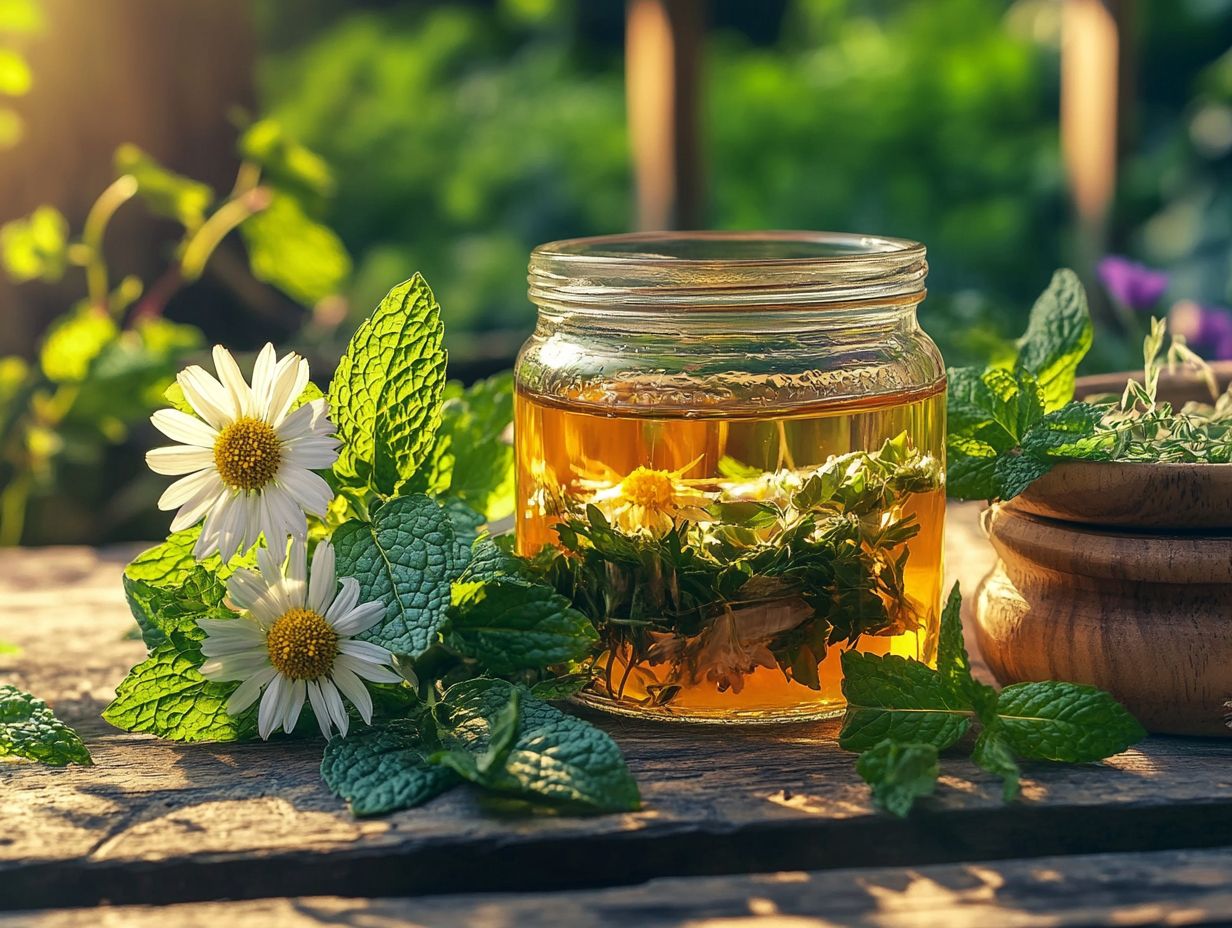
Some common herbal remedies for seasonal allergies include nettle leaf, butterbur, quercetin, elderberry, and eucalyptus essential oil.
How can nettle leaf help with seasonal allergies?
Nettle leaf contains natural antihistamines, which are substances that help reduce allergy symptoms like sneezing and a runny nose.
What is butterbur and how does it relieve seasonal allergies?
Butterbur is a plant that has been used for centuries to treat allergies, as it contains compounds that can block the production of histamines in the body.
Can quercetin help with seasonal allergies?
Yes, quercetin is a natural antioxidant found in many plants. It has been shown to reduce the release of histamines and other inflammatory chemicals in the body, providing relief for seasonal allergies.
How can elderberry be used to combat seasonal allergies?
Elderberry is known for its immune-boosting properties. It can help reduce inflammation and boost the body’s natural defenses against allergies.
What is the best way to use eucalyptus essential oil for seasonal allergies and allergy relief?
Eucalyptus essential oil can be diffused or applied topically to the chest and neck to help relieve congestion and other symptoms of seasonal allergies.
Explore these herbal options today and find relief from your seasonal allergies!

